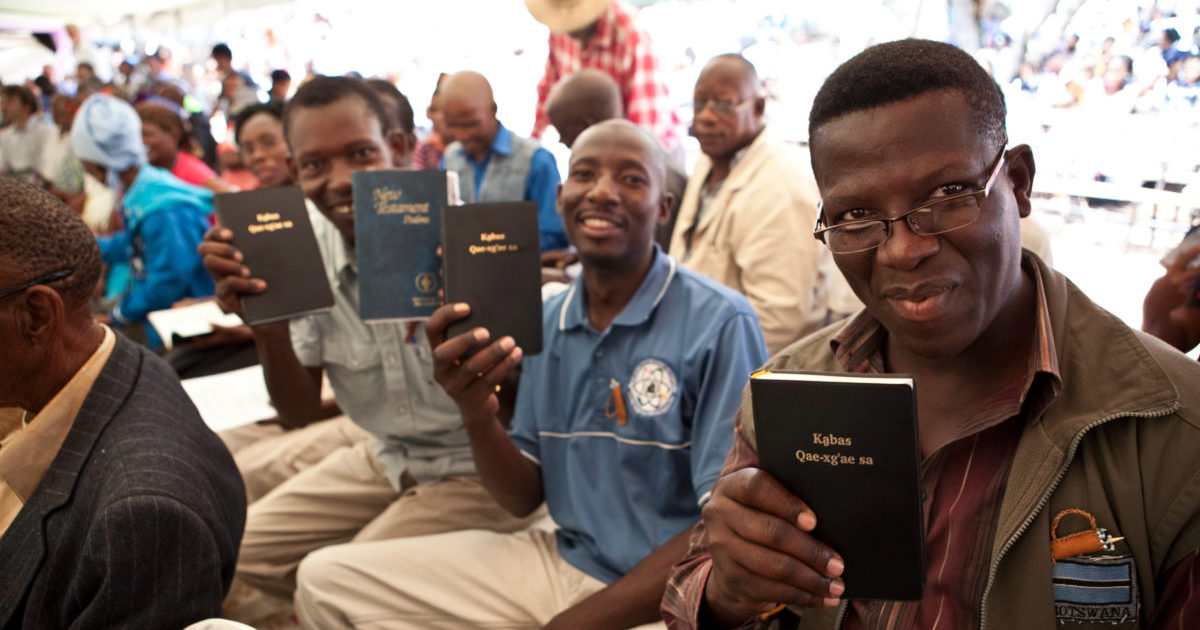
A group of men smile proudly as they hold their first copies of the New Testament in Naro in November of 2012.
Since I’ve been sharing with churches about the ministry of Bible translation, multiple churches have told me they are focusing on unreached people groups. For some churches, that means Bible translation is not something they think will fit with their missions focus. Other churches have asked us how Bible translation contributes to missions among unreached peoples. So, I’ve had some opportunity to think through the importance of Bible translation, especially among new churches in less-reached or unreached areas.
A Multitude of Benefits
Probably the most obvious way that Bible translation helps newer churches in unreached areas is by providing them with the necessary means for preaching, teaching, and discipleship. Getting Scripture into the heart-language of a people will assist with personal spiritual development of the people as well as discipleship, since preaching and praying and Bible study can all take place in a language the people understand best.
Second, Bible translation organizations work together in ways that benefit the unreached and assist in evangelism. Whenever Wycliffe Bible Translators complete a translation, it goes to several organizations. They send completed translations to YouVersion so that the unchurched have access to Scripture in their language via an app. I’ve heard stories of unreached people reading the Bible for the first time simply because it was the first writing in their language (the translation team had to come up with the alphabet from scratch). This was the case when Ellis Deibler translated for a group in Papua New Guinea. More pertinent is that they give the translation of Luke to the folks who do the Jesus Film, who then dub the film with the new translation and use it among that people group for evangelization purposes. This method of sharing the gospel has been pretty effective, from what I’ve heard. They also give their translations to Faith Comes by Hearing, which creates an audio version of the Bible, which gets released free online so evangelists, pastors, and locals can allow their people to listen to Scripture in their language.
Third, one of the most unreached classes of people includes the deaf, only about 2% of whom are Christians (if stats can be trusted; here’s one source and I’ve heard Wycliffe use a similar percentage). There are 350 sign languages in the world, and thus ~350 people groups (classified by language alone) who need not only Scripture in their language, but also the gospel. Wycliffe recently has committed to serving these deaf communities by adding these 350 languages to their list of those that need a translation project started.
Fourth, Wycliffe has an official partnership with the IMB, one of (or the?) largest missions organization in the states, and which focuses heavily on church planting. This allows each organization to focus on what they do best, rather than being generalists. IMB friends of mine (with field experience in Africa) have told us that IMB missionaries do work closely with Wycliffe missionaries in the field.
Protecting from False Teaching
When thinking through the effects of Bible translation in lesser-reached regions, it’s always helpful to hear a first-hand account about the impact. One account comes from Michelle S., who went on a short-term mission trip to the Philippines to help Bible translation workers in a village. As she traveled through the country, she noticed that many villages had suspiciously identical churches. When she reached her destination, she asked the Bible translator there about these identical churches.
The translator explained that missionaries had come and established many new churches and then handed them over to local leadership. Later, false teachers went to these churches and taught lies about who Jesus is and how to be saved. Unfortunately, the people in some villages believed them. They thought they must have misunderstood what the first missionaries had taught them. They conformed their churches to this new group and their false teaching.
Michelle asked, “But why isn’t that group here in this village? There is a church here, but it obviously hasn’t joined that group.”
The missionary smiled and said, “They tried to come here, but Bible translators got here first. When that group started preaching their false gospel, the people of the church pulled out the Scriptures in their language and checked out whether this new teaching was true. They told the group to leave. None of those other village churches have the Scriptures in their own language, so they have to rely on what others tell them to know who Jesus is and how to be saved.”

